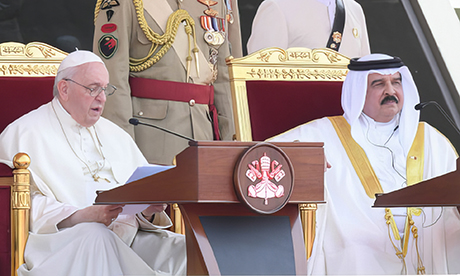Pope Francis’s stand on Bahrain’s death penalty shocked incredulous witnesses last week. His stand will be his trip’s legacy, says a death row inmate’s wife.
Francis made his views on the death penalty clear during his first speech in Bahrain last Thursday.
He chose the country’s royal palace to address two of the most contentious political issues in the country.
One was Bahrain’s treatment of prisoners; the other, its practice of capital punishment.
“I think in the first place of the right to life, of the need to guarantee that right always, including for those being punished, whose lives should not be taken,” Francis said.
His words were a direct challenge to his host, Bahrain’s King Hamad bin Isa Al Khalifa.
The King invited the pope to Bahrain. He also ended the kingdom’s de facto moratorium on capital punishment in 2017. Since then, six people have been executed.
At present there are 26 prisoners facing execution in Bahrain.
The Government has repeatedly denied any human rights violations or mistreatment of prisoners. “I was so happy to hear these words,” said Zainab Ibrahim, whose husband Ramadhan has been on death row since 2014.
Ramadhan also heard the pope’s speech live while watching BBC Arabic from prison.
“… This is really a moment that gave us hope, gave us joy for our family,” Ibrahim said. “There are no words to describe the pain we go through as a family,”Ibrahim says.
Ahead of the pope’s arrival for his 3-6 November visit to Bahrain, representatives from the London-based Bahrain Institute for Rights and Democracy met with officials from the Vatican embassy in Great Britain.
Their aim was to raise awareness of the situation of political prisoners and death row inmates in the kingdom. The institute also passed along letters from several inmates, directly appealing to the pope to take up their cases with the king, who has the authority to commute sentences or grant pardons.
“Your Holiness, … you believe in spreading love and peace and in the message of Jesus, who always sought to lift the injustice and suffering of the oppressed and the needy who did not find anyone to help them,” Ramadhan’s letter said.
Sayed Ahmed AlWadaei, director of advocacy for the Bahrain Institute for Rights and Democracy, says he wasn’t expecting Francis to directly address the issue, especially on his first day in the country.
Krisanne Vaillancourt Murphy, executive director of US-based Catholic Mobilising Network against the death penalty, says “even as a small number of nations like Bahrain continue to execute and condemn their citizens to death, most of the world is moving in the other direction.
“More than 140 countries have rejected the death penalty either in law or in practice,”she says.
“Pope Francis’ consistent witness…echoed Popes John Paul II’s and Benedict XVI’s opposition to the death penalty, but he “has gone on to clarify the Church’s teachings against capital punishment, including with a historic revision to the Catechism in 2018” that it is now considered “legally unnecessary and morally inadmissible.”
Source
